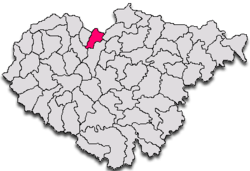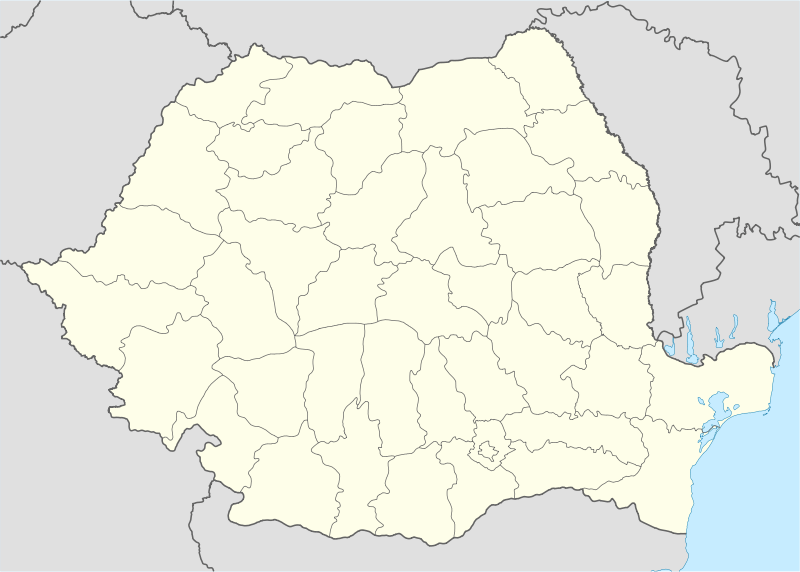Coșeiu
| Coşeiu Kusaly | |
|---|---|
| Commune | |
 Commune Coşeiu in Sălaj County | |
 Coşeiu Location in Romania | |
| Coordinates: 47°19′8″N 22°59′34″E / 47.31889°N 22.99278°E | |
| Country |
|
| County |
|
| Commune | Coşeiu |
| Historic region | Transylvania |
| Government | |
| • Mayor | Ioan Mureşan (National Liberal Party) |
| Area | 34.32 km2 (13.25 sq mi) |
| Population (2002)[1] | 1,332 |
| Time zone | EET (UTC+2) |
| • Summer (DST) | EEST (UTC+3) |
| Website | www.primariacoseiu.ro |
Coşeiu (Hungarian: Kusaly) is a commune located in Sălaj County, Romania. It is composed of three villages: Archid (Szilágyerked), Chilioara (Szilágykirva) and Coşeiu.
Population
At the 2002 census, 50.4% of inhabitants were Hungarians, 47.5% Romanians and 2.1% Roma. 48.6% were Romanian Orthodox, 33.3% Reformed and 16.6% Baptist.
History
Coseiu is a common in Sălaj County, Transylvania, Romania, about 18 km from the city Zalau. Is composed of three villages: Coseiu (residence), Chilioara and Archid. Historical: Charters first mentioned the name in 1345 as Kusal. In 1432 Kwsal, 1450 Kwssal, 1505 Kwssaly, 1549 Kwsaly, 1591 Kusalj, Kussally, Kusaj and in 1805 it was written as Coseiu.
Kusaly was the ancient estate of the Jakcsi family, the name is taken from here. The kusalyi Jakcs have risen fast, having held high offices in the coming centuries. Among the Jakcs descendants - whom the family name came from - George became the main royal treasurer in 1400, another of his children, Michael, between 1414 and 1428 Michael, later in 1437 he was the Voivode of Transylvania, then the espouse of Szekelyz. In 1444 Michael Jackh was also a Transylvanian voivode.
The family acquired estates in several counties, and held high offices in: Salaj, Satu Mare County, Szabolcs and Bereg counties as well. For example, in 1430 the Lord Lieutenant of the county Satu Mare was Laszlo Jakcs. In 1526, Michael Kusalyi Jackh attended the national assembly of Rakosi ambassador as the Diet of Bereg County.
The family name appears in documents in 1345 for the first time, and in the 1700–1800 years on the hilltops of the settlements traces of their castle can be seen.
In 1635 II. György Rákóczi Kusalyban donated a portion an estate to Stephan Serédi Krasna county lord lieutenant, the estate and the mansion soon became the property of the disloyal Szénási Mihaly, the captain of the field army.
In 1701 April 19, I Leopold King donated the kusalyi estate to baron Peter Serédi.
In 1910, 811, the majority of the inhabitants were Romanian, with a significant Hungarian minority.
In 1992, along with its neighboring villages, out of 1409 inhabitants 721 were Romanian, 672 Hungarian and 16 were Gypsy.
Sights
- Reformed Church in Coşeiu, built in the 15th century historic monument[2]
Coordinates: 47°19′N 22°59′E / 47.317°N 22.983°E
References
- ↑ Romanian census data, 2002; retrieved on March 1, 2010
- ↑ welcometoromania.ro - Reformed Church, Coşeiu, Sălaj County, retrieved on May 11, 2012
